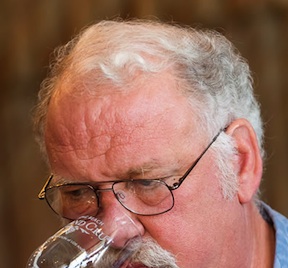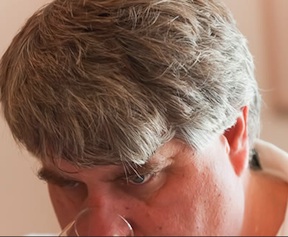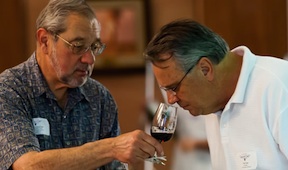Pitfalls and Talent at Wine Competitions
 Evaluating and assigning (or not) medals to roughly 80 young cabernets and syrahs, over a period of roughly an hour and a half is not hard work. However, to do it well requires certain abilities.
Evaluating and assigning (or not) medals to roughly 80 young cabernets and syrahs, over a period of roughly an hour and a half is not hard work. However, to do it well requires certain abilities.
I leaned this again this week after returning to wine competition judging after about 6 or 7 years away. I was in Long Beach helping to judge the Long Beach Grand Cru, a well established wine competition run by Dan Berger and benefiting the Legal Aid Foundation of Los Angeles.
When you run into people who ask, "Why are you in Town", and you tell them, "to judge a wine competition", they inevitably say something sarcastic like, "Wow…tough job". Their sarcasm is well placed. It's not a tough job in the sense that it's tasting wine, you aren't lifting bricks and you aren't making decision that have world shattering implications.
However, judging wines in this kind of setting does require a certain set of skills.
1. THE ABILITY TO CONCENTRATE YOUR PALATE
When you are letting slip the 25th young Cabernet over your palate in a half hour, judging the quality of each wine, and know that there are 25 more coming at you at the same pace, the battle is to overcome palat fatigue. There are various ways to care for the palate in this situation, but the real challenge is keeping your concentration and not letting wines slip by you without getting due consideration. More than anything else, the key here is experience. One needs to train themselves to move through the evaluating process methodically with an eye toward typicity, relative quality, flaws and understanding the wines' lasting impressions. This takes tremendous concentration.
2. THE ABILITY TO OVERCOME PREJUDICE
We all possess certain prejudice when it comes to wine. Some categories of wine we take seriously, others  we don't. White Zinfandel is an example of a wine that many don't take seriously. Yet, this is a wine that millions of people love and there are numerous winemakers that produce White Zinfandel knowing its drinkers expect something in particular. Appreciating this component of the wine market demands you take White Zin seriously when you are judging it. This is not as easy as it seems.
we don't. White Zinfandel is an example of a wine that many don't take seriously. Yet, this is a wine that millions of people love and there are numerous winemakers that produce White Zinfandel knowing its drinkers expect something in particular. Appreciating this component of the wine market demands you take White Zin seriously when you are judging it. This is not as easy as it seems.
3. UNDERSTANDING WINEMAKING FLAWS
My own palate is not as prejudiced against signs of Volatile Acidity as others. But too much is certainly a flaw in a wine. The same can be said for Brettanomyces. Some judges are extraordinarily put off by even the smallest signs of Bret. Others not so much. Yet, there is no question that wines exhibiting signs of these elements must be judged down. But how much of these elements in a wine is too much? There is a debate here and it's an interesting one. That said, understanding how and why these flaws make it into a wine is important to judging well.
The chief organizer of the Long Beach Wine Competition is Dan Berger, long time wine writer and wine lover. He runs a tight ship at this competition. He and his assistant Ludmila Montoya organize the tasting in such a way that judges are kept busy, wines come and go quickly, assistants bring and taking way wines do so in an incredibly efficient fashion and information about the wines, when needed, is right there when it is needed. It's really an amazing logistical accomplishment.
Truly impressive however were my wine judge compatriots. Most all of the judges were more experienced than I. Many have been judging for Dan at this competition and at Dan's Riverside County Wine Competition for many, many years. And it shows. To a person, these folks take a very businesslike approach to their judging, are very serious about their work and have the experience under their belt and the practiced talents necessary to fairly judge the many wines that come in front of them. I was awed.
 Sitting next to me judging, for example, was Mike Martini—Martini Winery, David Stevens—consulting winemaker and Jean Barrett, freelance wine and food writer. I don't know if they noticed by when I had the chance I would sit back and watch these pros work their way through their wines. What was fascinating was how each had a certain routine they took to the task. Watching them each, in their own individual way, bring the wine to their eyes, then nose then palate, you could see the wheels turning in their head with each wine. Little ticks of an eyebrow or wrinkled forehead gave away questions, concerns and surprises as they worked their way, methodically, through the wines in front of them.
Sitting next to me judging, for example, was Mike Martini—Martini Winery, David Stevens—consulting winemaker and Jean Barrett, freelance wine and food writer. I don't know if they noticed by when I had the chance I would sit back and watch these pros work their way through their wines. What was fascinating was how each had a certain routine they took to the task. Watching them each, in their own individual way, bring the wine to their eyes, then nose then palate, you could see the wheels turning in their head with each wine. Little ticks of an eyebrow or wrinkled forehead gave away questions, concerns and surprises as they worked their way, methodically, through the wines in front of them.
I don't know how I looked to them. But on a regular occasion, I was forced to back away from the line of wines in front of me, sit back and regroup. I had to wash my palate more often. I had to think harder than these pros at the table. And I was constantly concerned that I might not keep up. I'm happy with my work. But it reaffirmed for me that the real skill and talent that not only these people bring to the table, but also the skill and talents that the best wine critics must bring to the table if they evaluate many wines on a regular basis.
Wine competitions are valuable tools for the wineries that submit wines as well a the judges. For the judges, it gives them a chance to observe a vista of current winemaking trends where style is concerned. The large number of wines from around the world and country that at wine competition judge is allowed to survey most certainly leaves impressions about what's happening with winemakers.
I am grateful for having the chance to sit in a room and judge wines for two days. It reinvigoratted my appreciation for not only wine competitons, but also for those that organize them and participate in judging them.

Good on ya for the insightful commments, Tom. As one of your fellow wine judges at this year’s Grand Cru, let me say that it was very, very well-run and your observations were spot-on. Tasting through scores of wines is not a picnic, but quite rewarding nonetheless. Cheers.
I think Tom is right, that there is a lot to learn working for a judging organized by Dan Berger. It certainly is far beyond what I would attempt. I tended to learn from a home-spun, conservative method, finding a few chateaux whose Medoc I thought balanced, then following their releases over several years. The same winery-centric approach is instructive in understanding CA wines, of the sort a grocer might sell.
With respect to volatile acidity, I have noticed that a few CA wineries, as I experiment and taste ones with whose products I had little familiarity, continue to find inventive ways to have elevated VA of various sorts, as well as parallel techniques for masking it.
Often, I have wondered how judging proceeds, as I have not attended one. To me, a prime test for VA is the uncorking moment, and the quick pour, rather than decanting, or letting a sample sit in the glass awhile before nearing it to the taster.
I suppose, the sorts of wines at cab tastings are better balanced than these thoughts of mine with respect to the volatile acidity component would indicate.
Further, I fully recognize the difficulty of quick sequences of tasting, and find it nearly impossible to imagine how judges accomplish a state of having a fresh palate in such paced competitions.
Still, all for a good cause; I have read that the CA budget recently drafted reduced funding to lafla org; maybe the tasting will help replace some of that depletion. I hope the governor recognizes the assist he is receiving from Dan Berger in helping finance the service which lean times have forced lawmakers to underfund over the next fiscal year.
Great piece, Tom. You have hit the perfect tone to make people aware of how seriously the judges at these events take their work. Guys like Mike Martini and Dave Stevens know what they are doing – the kind of talent that winery owners pay $$$ to consult with. No need to be quite so modest – I have tasted with you and in my opinion you, sir, are no slouch either.
And you too Dave V!!! 🙂
Howdy there! Inspirational post you have here, participating in a wine competition is not an easy thing. I always ended up eliminated in early rounds.
Great article. This are great insights and of course a wonderful topic. Thanks for posting this one!
Great blog. I think you were better for washing your palate as often as needed.